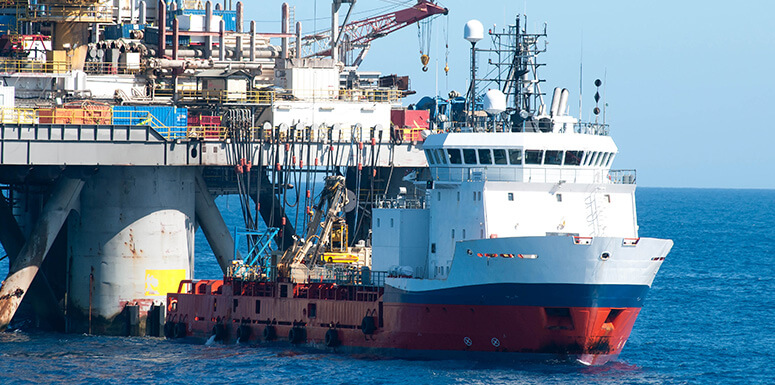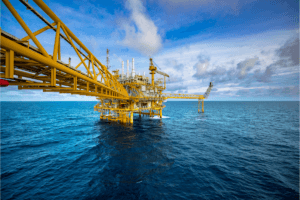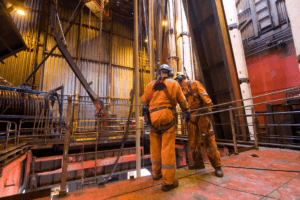
The offshore oil and gas industry is not only an essential part of the nation’s economy, but it also provides thousands of jobs to workers in Texas. However, offshore oil extraction continues to be a dangerous field because of the combination of heavy machinery, long working hours, and constant exposure to hazardous conditions.
Even though the oil rig crew members are trained and understand the risks they face, there is no excuse for unsafe work environments or cutting corners when it comes to safety. Employees who become injured on the job and believe their work-related injuries were the fault of the employer or a third party have options for compensation and should speak with an experienced Houston offshore injury lawyer right away.
Oil Rigs Are Valuable to the Industry but Dangerous to Workers

Offshore oil rig workers are at risk for injuries such as:
- Amputation
- Back and neck injuries, including paralysis
- Broken bones and fractures
- Blunt force trauma
- Burns from chemicals and flames
- Crush or caught-between injuries
- Drowning
- Head injuries, including to the eyes and mouth
- Hearing loss
- Internal organ damage from inhaling toxic substances
- Puncture wounds
- Repetitive stress injuries
- Respiratory damage from gases and fumes
- Shrapnel from explosions and malfunctions
- Traumatic brain injuries
Suppose you have been the victim of an oil rig accident. In that case, it is important that you consult with an experienced offshore injury lawyer in Houston, TX who understands the complex and unique set of maritime laws and how they may apply to your case. In some instances, your worksite may qualify you to pursue a claim under the Jones Act.
Top 5 Causes of Injuries on Offshore Oil Rigs
While maritime workers can face many kinds of situations that could lead to harm or illness while working offshore, these are the most common causes of oil rig injuries we see at our law firm.
1. Transportation Accidents
According to the CDC, motor vehicle accidents accounted for 40% of fatalities among oil and gas industry employees in the most recent reporting year. Offshore oil and gas workers largely rely on helicopters and water vehicles to safely transport them to and from rigs. The vast majority of transportation-related incidents involve helicopter accidents in the Gulf of Mexico, with mechanical failure and adverse weather conditions causing most incidents.
Preventing injuries and fatalities from these kinds of offshore accidents requires implementing appropriate safety checks for operating vehicles, as well as instituting rest break regulations. Driving an automobile, such as a car or truck, requires concentration, but even more focus and preparation are needed to reduce the number of boat and helicopter incidents.
When transportation drivers and operators work too long and don’t get enough sleep, they put everyone in their vehicle at risk. In addition, they could involve others, such as those on the rig, dock, or landing pad. Drivers who use alcohol or other substances that impair their cognitive function and reaction reflexes are not only putting their fellow employees in danger. They are breaking company policies.
2. Contact with Objects or Equipment
Oil rig and platform workers deal with heavy machinery every day. Workers can be struck by falling objects such as turbines, cranes, and forklifts. They can also be crushed between equipment that is not properly secured, is used incorrectly by crew members, or when workers have not been properly trained in the safe use of equipment.
On many rigs, equipment operators are contractors from outside companies. They may not undergo the same training with the same rigor that you and your coworkers have. This could lead to negligence for a number of reasons, including:
- Failure to follow safety rules and regulations
- Failure to pay attention to the equipment and its surroundings
- Fatigue or drowsiness from long shifts with too little sleep
- Fighting, roughhousing, or other violations of company policy
- Influence of alcohol or drugs while working
- Insufficient training
- Lack of experience operating the equipment
- Poor communication among operators and other workers
- Taking risks or making dangerous choices
Much like preventing transportation accidents, proper training, safety requirements, and ensuring equipment operators are sufficiently rested can cut down on these injuries and fatalities. The employer bears the most responsibility for providing a safe workplace for all employees and can be held liable when they fail to uphold their duty.
3. Fires and Explosions

Disasters like these and other such incidents can be mitigated when rig companies employ well control strategies recommended by the Environmental Protection Agency (EPA) and train their employees in the relevant procedures. Every oil rig worker should be familiar with these strategies and how to maintain the equipment to prevent injuries and fatalities, as well as damage to the environment.
4. Exposure to Harmful Substances or Environments
Offshore oil rig workers can come into contact with a variety of potentially harmful substances, including crude oil, solvents, drilling fluids, and production chemicals. Workers who are exposed to toxic chemicals or fumes can experience respiratory problems, allergic reactions, rashes, chemical burns, and asphyxiation.
No matter where an employee is stationed, they run the risk of coming in contact with substances that could injure or kill them immediately. They also are in danger of long-term exposure to materials that could increase their tendency to develop cancer, respiratory damage, and other diseases. As always, the use of proper safety gear and training measures for all employees can go a long way toward reducing these problems.
Getting hazardous substances on your skin and clothes means you could transport these chemicals to others when you are off-shift. If you live on a nearby ship, you could contaminate the surfaces and workers who are not assigned to the same areas as you.
5. Falls, Slips, And Trips
Falls, slips, and trips from a higher level onto lower decks or into the ocean can lead to serious injuries or even death. Slip and fall accidents can happen when wet or oily substances are allowed to collect on floor surfaces. They are also a problem when ladders or scaffolds are not properly secured or work areas are not properly inspected for potential hazards.
Poor rig construction by an outside company can also contribute to falls and trips. Any time contractors or vendors visit the structure for resupply or maintenance, they should follow all safety rules and procedures to reduce the risk of injuring full-time rig workers. When a non-employee is responsible for your accident, you can speak with our offshore injury attorneys to hold them accountable for their negligence.
Employers are responsible for maintaining a safe work environment, which includes making sure that floors are regularly cleaned, non-skid surfaces are used when appropriate, and fall protection exists in the form of guardrails, harnesses, handrails, and grating. In addition, walkways should be cleared frequently to reduce tripping hazards.
What Should You Do When You Have Suffered an Injury on an Offshore Oil Rig?
Your first action should be to seek medical help. When your injuries seem minor, it may be tempting to bandage them quickly and get back to work. However, failing to get medical attention and report your maritime accident puts you at risk of being blamed for your injuries when you file a claim for compensation. If you don’t have a record of when the accident happened, how it occurred, and the way you were hurt, you will have a harder time fighting for what you deserve.
After you’ve been initially evaluated and treated, it’s a good time to contact an experienced Houston offshore oil rig attorney to discuss your next steps. If a contractor or other entity is at fault for your accident, you may be eligible to seek financial relief from them for your medical costs, lost income, and other damages. How much your case could be worth depends on the circumstances.
When you pursue an insurance claim or maritime injury lawsuit, you need someone who will fight hard for your compensation while you focus on getting better. Settling these cases can sometimes take months, and lawsuits may last even longer. You can trust that our experienced and award-winning legal team will work hard to get the best settlement available as quickly as we can without sacrificing your rights. When an insurance company does not meet our demands, we are prepared to take them to court.
How Our Houston Offshore Injury Lawyers Can Help
Every case is unique, and your lawyer can listen to the details and help you develop an action plan. At The Krist Law Firm, P.C., we identify who is at fault and investigate the claim to build a case for the best possible outcome in your situation. We know you rely on your income to support yourself and your family, and you shouldn’t have to pay for someone else’s mistake with a permanent injury to your body or the loss of your ability to work.
The skilled team of maritime accident attorneys at The Krist Law Firm, P.C. has more than four decades of experience handling virtually every type of oil rig accident and injury. We are dedicated to providing exceptional customer service, and we will fight for the maximum compensation possible in your case. We are proud of our work on offshore injury cases, and our successful track record includes winning one of the largest maritime accident recoveries in Texas history.
Contact us to schedule a free case evaluation with one of our offshore injury lawyers today.

